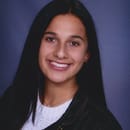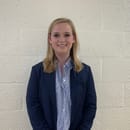Elsa Sjögren is a freshman from St. Louis, Missouri who’s found a particular niche for computer science. Throughout her high school years, she found a way to combine her social personality with her academic interest in computer science by working for a nonprofit in her hometown where she helped the elderly with their technological challenges.
Her Campus: Tell me a little bit about the work you did with the elderly and technology in high school.
Elsa Sjögren: There is a non-for-profit elderly home in St. Louis called The Crown Center for Senior Living and it was founded by Laura Crown and her husband. She was a Jewish woman, and along with a group of other Jewish women, they started this home. It’s really a program where you can pay what you’re able to [in return for a service]. For example, their dinner programs, they are technically only $1 for dinner, but it’s a situation where if you have $5, you give $5; but the nice thing is it really only is $1 for a full, hot meal. When I got started [with The Crown Center], I came in and I started volunteering in the dining room, so serving meals, cleaning meals, which I loved because you get to talk to a lot of people and you meet a lot of very interesting people. And then from there, I wanted to get more involved, so I started working in the café during the day, and the whole Crown Center is kosher, so they serve meat at night and dairy during the day — obviously there’s no pork. I learned all about the Kiddush traditions, and that was really an eye-opening experience as I am Presbyratiran, and while I have a lot of Jewish friends, I wasn’t learning about the rituals.
So, I was working in the café and dining room, but I still wanted to get more involved, and so the woman who runs the volunteer services, said there are a lot of residents who get electronics from their family for Christmas — nowadays, everyone has electronics as its the only way you can communicate. There’s a library in the center where there are computers and you can go on your email and access the Internet, and a lot of people in the older generation, they don’t know what Gmail is — no one has ever taught them how to work these things and the instructions for how to work them are on the Internet, so it’s like, how are they ever supposed to learn? And their grandchildren and children, who are so kind to give them an e-reader or a cellphone or an iPad, they’re giving them out of kindness but they aren’t there to teach them how to work. So that’s kind of where I came in — I would teach people how to use cell phones, laptops, e-readers, and just kind of go through the step-by-step things, like turning on your phone, that we think is so easy.
HC: What were some of the biggest challenges with this experience?
ES: The elderly have very shaky hands, so it’s really hard for them to click on screens and press, be it arthritis, dementia, whatever is happening, it’s a small screen, small print, and even when you set the text font as big as it will go, it’s still pretty small. So, a lot of times I would bring in styluses to try and help, because they’re more familiar with using a pen and that’s more in their wheelhouse. You had to be really patient doing things that we do in ten seconds because it takes them more time.
HC: How do you plan to pursue computer science in the future, and how was combining this passion in the nonprofit center?
ES: Through my work with robotics and MakerScience, I really learned that I enjoy computer science a lot but I’m a people person. I can’t sit and code my life away! So, I’m thinking that if I can combine my love for geriatrics — I thought about one time starting a Code-a-thon for the elderly, and using simpler programs such as Python or Owlet or a more user-friendly program.
HC: Have you taken any computer science classes at Wake so far and what have you thought about them?
ES: I have joined the Women in Computer Science and the Women in STEM club. I’m currently taking Computer Science 111 and registering for Computer Science 112, and I really love the program. I was fortunate enough to get one of the only women teachers in the department.
HC: What’s one piece of advice for a student looking to combine their passions and still give back to the community?
ES: I would say that it’s just important to keep in mind that you might be working with one minority, like I did with the elderly, doesn’t mean that they aren’t knowledgeable about so many other things. That was one of the hardest things for me was trying to teach a professor of microbiology how to use a cellphone — I mean, this is someone who has worked with microscope their whole life and has years on years of knowledge that I will never be able to compile in my own brain. You just have to pick something that your interested in, maybe something a friend of yours is also interested in, and take the first opportunity that comes along.



